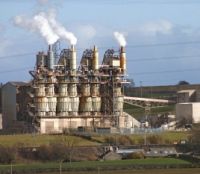

A cement factory in Flintshire has admitted breaches in legislation which would potentially have caused a cancer risk. Castle Cement Ltd admitted four charges relating to dust and noise at Padeswood as well as two fires which released potentially dangerous smoke.
However, despite the possible increased risk of cancer and other illnesses, Mold Crown Court heard no cases had been detected. The charges covered a period between August 2005 and May 2007, and the company asked for a further offence bringing matters up to October 2009 - involving an escape of 250 tonnes of dust from a broken pipe - to be taken into consideration. The Environment Agency said the £300,000 fine and costs were "one of the highest ever awarded for an environmental offence in the UK."
Judge John Rogers QC said it was accepted there was no evidence of actual harm to any members of the public, however it was clear there was potential risk from the dust and carcinogenic materials in the smoke. He commented, "These were persistent breaches of environmental permit conditions resulting in dust emissions, smoke emissions from burning tyres and other materials and unacceptable noise levels. Emissions of dust and the fire particles put the general public to some potential risk of injury to their health." The breaches continued despite enforcement notices.
In mitigation, the company had co-operated throughout the investigation and had pleaded guilty at the earliest opportunity. The judge said he was satisfied the company had invested £1.8 million trying to improve procedures. Emissions from the works caused a "measurable increment" in concentrations of airborne particles, measured as PM10. The fires were also a source of "polycyclic aromatic hydrocarbons", which were genotoxic carcinogens, of which even small exposure carries a risk of causing cancer.
The offences occurred following the commission of the new large £70 million Kiln Four, which replaced three earlier kilns in August 2005. The court heard the company had been fined £99,000 in March 2006 for breaches involving the release of dioxins from the old kilns. They admitted that it failed to maintain all plant and equipment in a good operating condition, failed to comply with enforcement notices, failed to operate appropriate techniques to minimise fugitive dust emissions and failed to control excess noise and vibration at the plant.
For more information see: